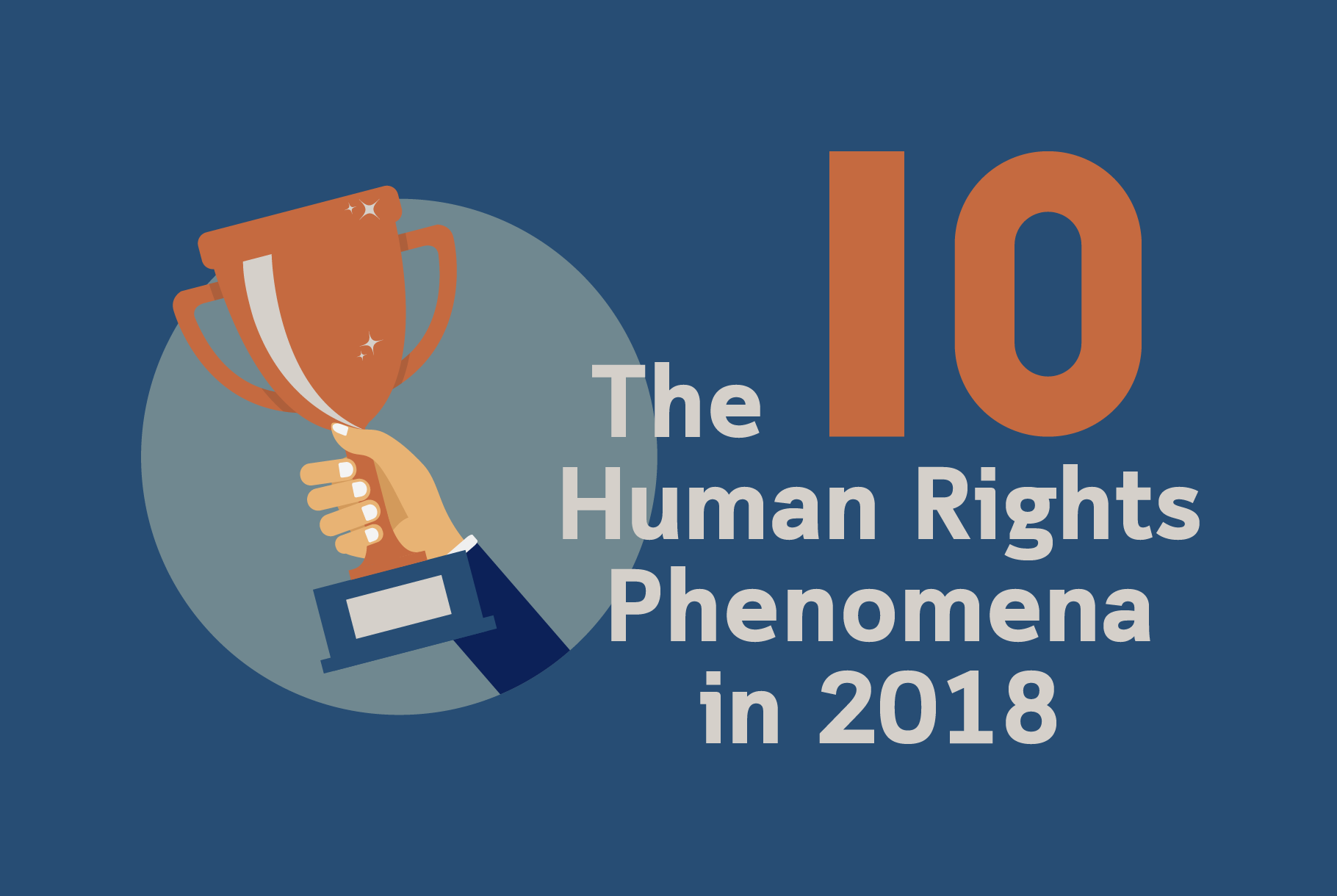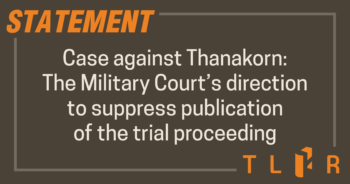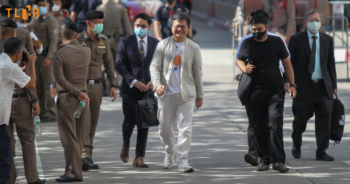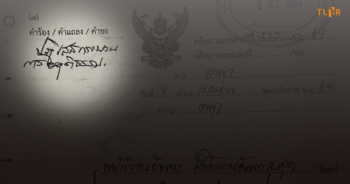2018 marks the fifth year since the Thai military staged a coup in Thailand, installing the National Council for Peace and Order (NCPO) in government. During these five years, human rights violations have continued unabated. Restrictions of freedom of expression, holding individuals in custody in military barracks, prosecuting those exercising their rights and freedoms in order to silence them and create legal burdens for them, the use of Military Courts to try civilians, and various forms of harassment and intimidation have been made part of a new normal year after year.
Meanwhile, the yearning for democracy has prompted various groups to come out and make their demands known. These people have either called for elections, checks and balances on the exercise of power by Thailand’s rulers, demanded access to livelihoods and their rights over natural resources in their communities, or posted their opinions online, making themselves increasingly vulnerable to targeting by Thai authorities, etc.
As the year is drawing to an end, Thai Lawyers for Human Rights (TLHR) has compiled major moments highlighting the ongoing situation of human rights violations and the struggles of the people as they pin their hopes on restoring the ‘normalcy’ in which their rights and freedoms are respected.
The “Pro-Election Activists”, the largest number of alleged offenders of the year
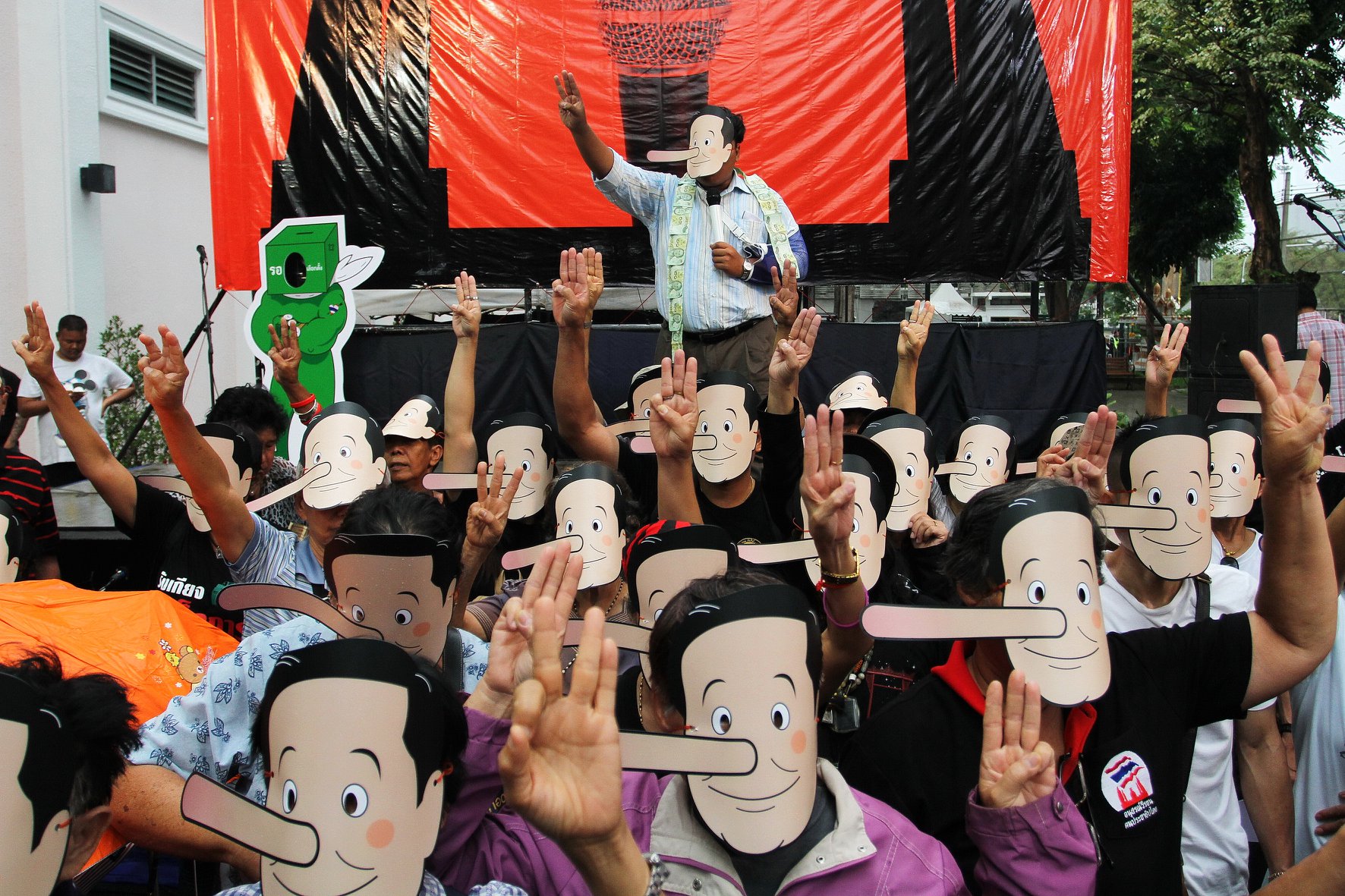 2018 was the year when the countdown to the 2019 elections began, prompting people to become more politically active after being suppressed for nearly five years. If the elections are not subject to another delay, national election is scheduled for February 24, 2019.
2018 was the year when the countdown to the 2019 elections began, prompting people to become more politically active after being suppressed for nearly five years. If the elections are not subject to another delay, national election is scheduled for February 24, 2019.
Before the general public or politicians have been able to express themselves in the elections, from January to May 2018 groups of people have taken to the street to voice their resistance to another delay of the elections. The NCPO has since been put under pressure to promptly organize elections after many postponements and the refusal to pin down the exact date for elections. The civic group who calls itself “Pro-Election Activists” had organized peaceful and unarmed mass protests to give voice to their demands on at least eight separate occasions.
However, the demonstrators who laid the first bricks paving the way for the elections have been taken to court as a result of their actions. Charges have been filed against them for violating the Head of the NCPO Order no. 3/2558, the Public Assembly Act, the Penal Code’s Section 116, the Amplifier Act and even the Road Traffic Act.
As a result of the protests, representatives of the NCPO have filed ten legal cases against the demonstrators. Each case has been nicknamed according to the venue of their protest and the number of the individuals charged including MBK39, RDN50, ARMY57, CMU06, PATTAYA12 and UN62. For the MBK39, RDN50, ARMY57 and UN62 cases, while the demonstrators are facing less severe charges, the protest organizers are facing felony charges including the violation of the Penal Code Section 116. Totaling 130 people, this group constitutes the largest number of alleged offenders criminalized on a similar offence in 2018. Some individuals face more than one case as they participated in at least two different demonstrations.
This ongoing legal action against pro election activists while the country readies itself for forthcoming elections is indicative of the state of freedom of expression likely appear unfair and unfree elections for Thailand in 2019.
The case against villagers in “Doi Thevada”: The glaring role of the military
 For more than four years since seizing power, the military has expanded its role in different segments of Thai society. This expansion has been the subject of monitoring and criticism by the people, despite attempts by the NCPO to keep such scrutiny at bay by censoring media, putting pressure on critics, and conducting information operations to stifle freedom of expression.
For more than four years since seizing power, the military has expanded its role in different segments of Thai society. This expansion has been the subject of monitoring and criticism by the people, despite attempts by the NCPO to keep such scrutiny at bay by censoring media, putting pressure on critics, and conducting information operations to stifle freedom of expression.
One of the most glaring exercises of power by the military in 2018 which led to widespread criticism and media coverage was the military clamp down on local villagers in Ban Doi Thevada, who organized a walk to show their solidarity with the People Go’s “We Walk…Walk for Friendship”. Ten villagers were charged by the representative of the NCPO for violating the Head of the NCPO Order no. 3/2558.
Following the filing of charges, the villagers in Doi Thevada demanded the cases be dropped. The complaints they lodged with local authorities infuriated local military officials, prompting an intelligence military official to flash his middle finger to a camera during the live broadcast of the People Go Network’s activity at the Phayao Government Center. Even though the official denied deliberately flashing the middle finger – claiming he was just waving his hand – mounting public pressure forced both the military official and the Third Army Area Commander to apologize to the public. The official has been transferred to other post in another province.
The case against the villagers in Doi Thevada was brought to an end when both the police and public prosecutor decided to drop the charges, deeming the demonstration a non-political gathering. Nevertheless, the exercise of power by the military officials in this case, from summoning villagers for inquiry, to holding them in custody in the middle of the night, to have them answer to the charges, and putting pressure on the villagers through different ways, highlighted a flagrant violation of rights and freedoms and warrants a place in this year’s ranking.
Col Burin: The report in chief of who has brought most cases against civilians
 Since TLHR started to offer legal assistance to those who have been affected by the military coup in May 2014, until now 140 individuals have sought our legal support in 31 cases. Their prosecution is a direct attempt to restrict the rights to freedom of expression and peaceful assembly, by charging people for political gatherings of five persons and upward (nine cases), sedition (Penal Code’s Section 116 – five cases), lèse majesté (Section 112 – five cases) and computer crime (four cases). The police and military are involved in the reporting of at least 17 of these cases.
Since TLHR started to offer legal assistance to those who have been affected by the military coup in May 2014, until now 140 individuals have sought our legal support in 31 cases. Their prosecution is a direct attempt to restrict the rights to freedom of expression and peaceful assembly, by charging people for political gatherings of five persons and upward (nine cases), sedition (Penal Code’s Section 116 – five cases), lèse majesté (Section 112 – five cases) and computer crime (four cases). The police and military are involved in the reporting of at least 17 of these cases.
In 2018 alone, the NCPO has authorized its personnel to bring at least eight charges against individuals to prevent them from organizing a peaceful assembly. Five of these cases have been reported to the police by Colonel Burin Thongpraphai, legal officer of the NCPO.
Moreover, the NCPO continues to arbitrarily detain people by invoking the Head of the NCPO Order no. 3/2558. The situation has even escalated further. Information and confession obtained during military investigations of arbitrarily detained people and inquiries by military authorities have been used to ask the Court of Justice to issue arrest warrants in at least two cases. Meanwhile, some suspects have to face other related charges pressed by the inquiry officials (for disobeying the order of competent official) or by the Court (contempt of court) as well.
Anon-Ja New-Rome: The three most persecuted individuals in the aftermath of the military coup
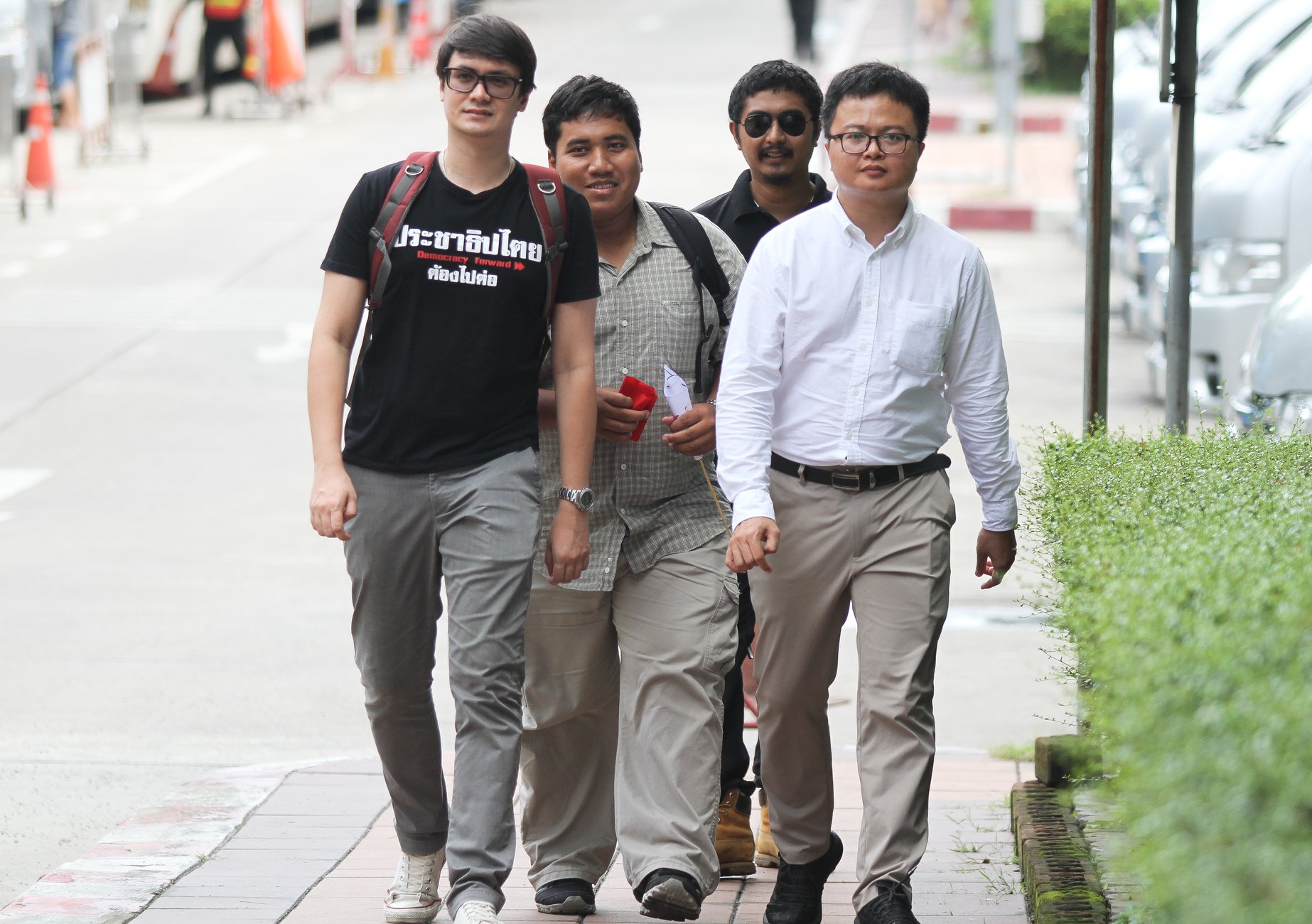 Since the seizure of power by the NCPO, the exercise of freedom of expression has been restricted and people who exercise such rights and freedoms have faced intimidation and legal action. This includes villagers protesting against large scale development projects by the state or private investors in order to preserve their natural resources such as gold and potash mines, people who have been affected by the forest reclamation policy and Special Economic Zones, and even activists who come out to demand democratic elections and investigations into corruption.
Since the seizure of power by the NCPO, the exercise of freedom of expression has been restricted and people who exercise such rights and freedoms have faced intimidation and legal action. This includes villagers protesting against large scale development projects by the state or private investors in order to preserve their natural resources such as gold and potash mines, people who have been affected by the forest reclamation policy and Special Economic Zones, and even activists who come out to demand democratic elections and investigations into corruption.
For nearly five years, among the most persecuted individuals is Anon Nampa, a human rights lawyer and a member of the Citizen Resistant. Altogether, he faces 11 cases, followed by two activists Sirawith Seritiwat, aka ‘Ja New’ who faces 10 cases and Rangsiman Rome who faces nine cases.
The trio have all been prosecuted as a result of their exercising the right to freedom of expression. It should be noted as well that three similar charges have repeatedly been pressed against them including the violation of the Head of the NCPO Order no. 3/2558, the Public Assembly Act and sedition per the Penal Code’s Section 116. It could then be surmised that the three charges are a major political tool used by the NCPO, and as a result hundreds of people have been taken to court.
The most common charge
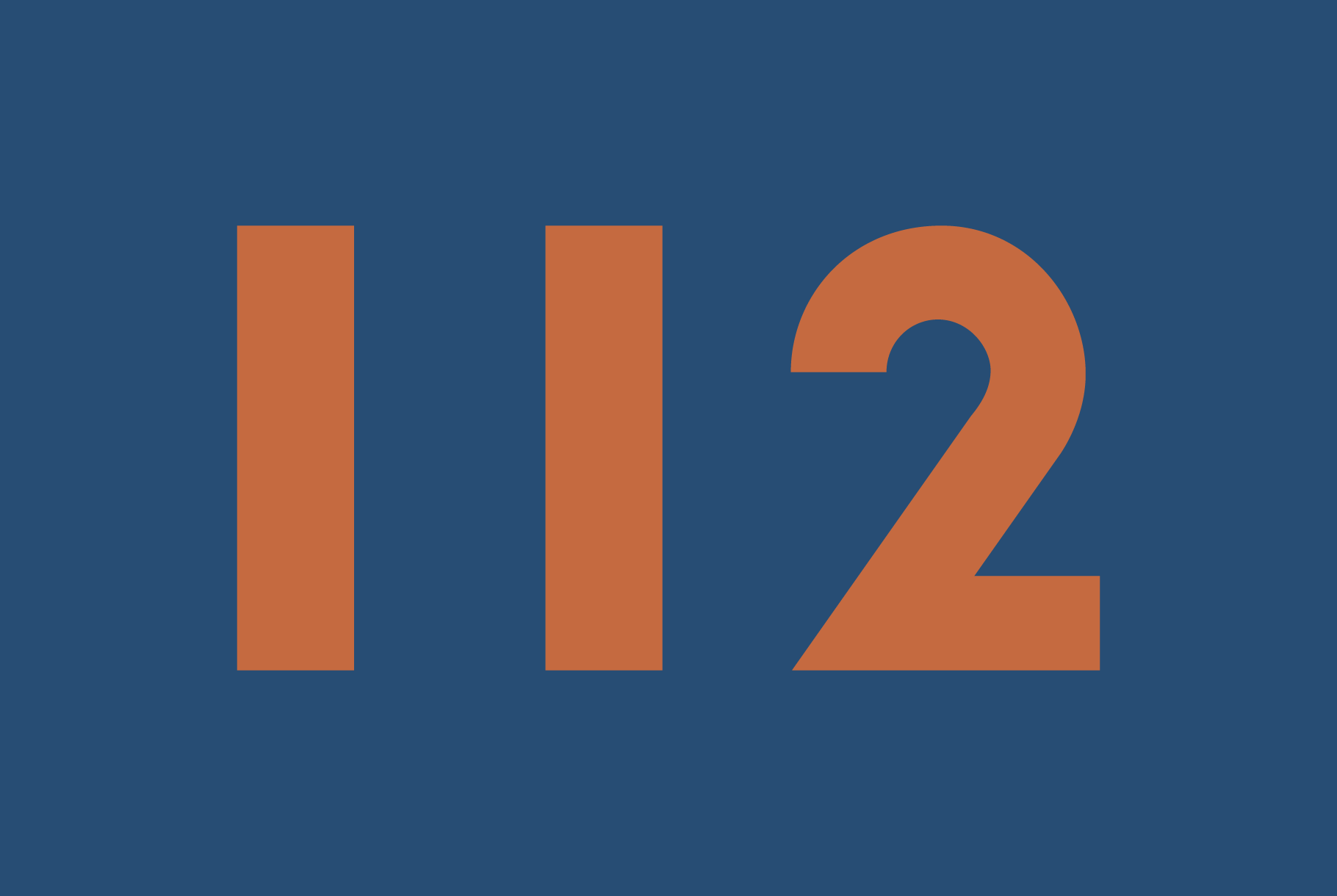 Into the fifth year in power, the coup-makers, the NCPO, alongside seizing power, has been using laws as a tool to muzzle people extensively. This is to ensure the sustained power of the coup-makers. Many laws have been invoked including Martial Law, the Interim Constitution 2557 (2014), the NCPO Orders and Announcements, newly promulgated statutory laws, and the codification of NCPO Orders and Announcements into the permanent Constitution. This has led to many people facing criminal charges which could result in punishment, from paying a small fine to protracted incarceration.
Into the fifth year in power, the coup-makers, the NCPO, alongside seizing power, has been using laws as a tool to muzzle people extensively. This is to ensure the sustained power of the coup-makers. Many laws have been invoked including Martial Law, the Interim Constitution 2557 (2014), the NCPO Orders and Announcements, newly promulgated statutory laws, and the codification of NCPO Orders and Announcements into the permanent Constitution. This has led to many people facing criminal charges which could result in punishment, from paying a small fine to protracted incarceration.
From our monitoring, since the May 22, 2014 coup, the most common politically motivated charge used is lèse majesté per the Penal Code’s Section 112. 79 cases have been brought against at least 108 defendants for defaming the monarchy, either for them exercising their right to freedom of expression or claiming their connection with the monarchy. Alongside this, charges have been brought against people with mental illness.
The charge that has led to the largest number of suspects is, however, the violation of the Head of the NCPO Order no. 3/2558 which bans a political gathering of five persons and upward. At least 43 cases involving 341 defendants have been brought under this charge. Most people have been charged as a result of organizing in the run-up campaign for the Constitutional Referendum in 2016, and for demonstrations demanding prompt elections by NCPO. Most of the cases are still ongoing while cases tried in the Military Court are moving extremely slowly.
6,440,000 baht: Total amount of bail paid in 2018
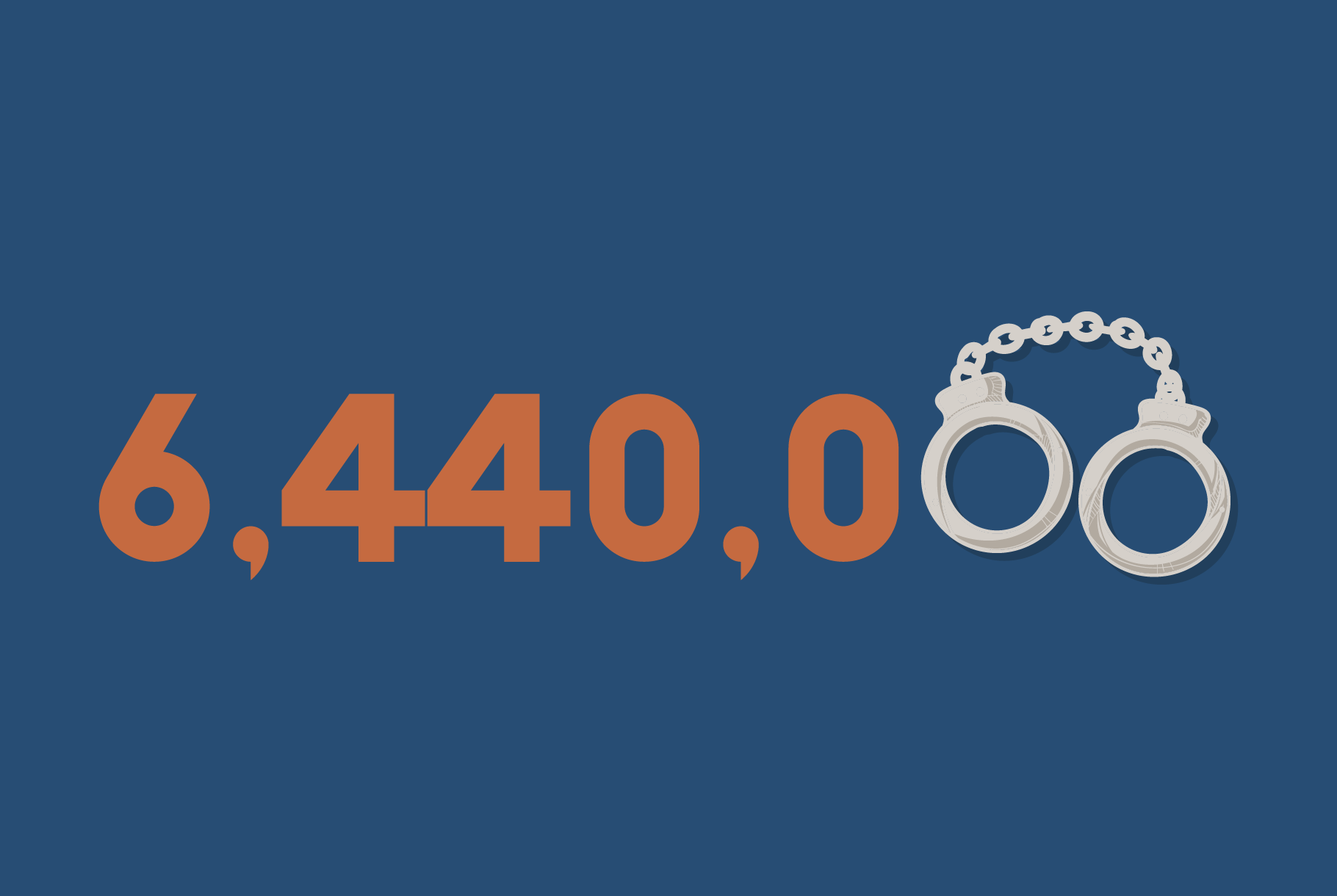 2018 saw the largest number of new clients for the Thai Lawyers for Human Rights (TLHR) since its inception. Until November 30, 2018, of 254 persons prosecuted this year, 141 had never been prosecuted by the NCPO previously. Most of the legal actions have stemmed from people being involved with the campaign of the “Pro-Election Activists” in various places.
2018 saw the largest number of new clients for the Thai Lawyers for Human Rights (TLHR) since its inception. Until November 30, 2018, of 254 persons prosecuted this year, 141 had never been prosecuted by the NCPO previously. Most of the legal actions have stemmed from people being involved with the campaign of the “Pro-Election Activists” in various places.
The sheer number of alleged offenders and defendants has resulted in a staggering amount of bail and a burden on the accused. The highest bail in one case this year was 1.5 million baht, for the release of 15 alleged offenders in the pro-election rally case, the demonstrations of which took place at the entrance of Thammasat University, Tha Phrachan Campus and in front of the United Nations Headquarters during May 21-22, 2018. The demonstrators are accused of committing sedition, a violation of the Penal Code’s Section 116.
The suspect who warrants the highest amount of bail is, however, Sakan (last name withheld), who stands accused in the Criminal Court for defaming the monarchy and another suspect Anchan (last name withheld), a defendant of the Bangkok Military Court. The Courts set their bail at 500,000 baht each. Similarly, Nutthaphan Lumbanglar, a suspect alleged to have had RGD5 explosive in his possession stood trial in the Bangkok Military Court and complained about tortured while being held in custody was also released after posting a 500,000-baht-bail-bond.
Until November 30, 2018, all clients of the Thai Lawyers for Human Rights (TLHR) have been bailed out after posting the total amount of 6,440,000 baht. It should also be noted that this year saw the first use of electronic monitoring devices (EM) to allow alleged offenders or defendants who have no money to post bail to get released, though they are required to wear the devices. It has, however, created a burden on their daily life having to live with these devices 24 hours-a-day.
The Defiant “Ekkachai”, who continues political actions despite being physically and legally harassed throughout the year
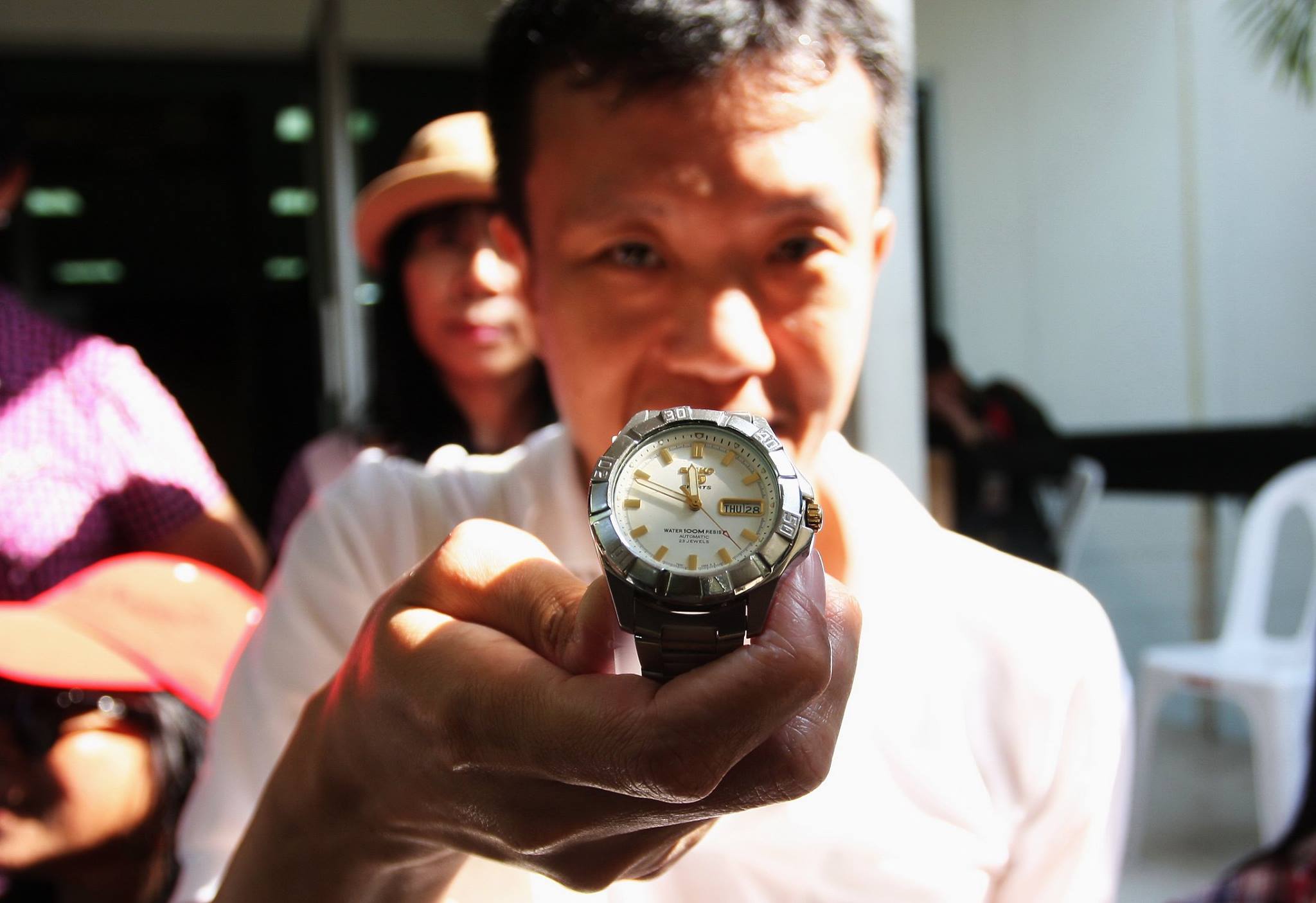 Since the controversies around “Pom’s wristwatches” – the luxurious wristwatches worn by General Prawit Wongsuwan – broke out last year, there is at least one person who has continued to demand an inquiry into the sources of these 25 pricey wristwatches even though such sagas are starting to fade away from mainstream media.
Since the controversies around “Pom’s wristwatches” – the luxurious wristwatches worn by General Prawit Wongsuwan – broke out last year, there is at least one person who has continued to demand an inquiry into the sources of these 25 pricey wristwatches even though such sagas are starting to fade away from mainstream media.
Ekkachai Hongkangwan has tirelessly demanded an inquiry into this matter despite having to shed his blood. He became a victim of physical assault committed by three unknown persons who hid themselves at the mouth of the alley to his house in Lat Prao on August 22, 2018. He was returning home after submitting a letter demanding an inquiry into the alleged corruption and the sources of the wristwatches worn by General Prawit to the Government House. The investigation into the physical assault against Ekkachai has seen no progress until now.
A few weeks earlier, Ekkachai was hit by a bag of fermented fish and was briefly detained by the police in front of his own house upon his return from his attempt to wish General Prawit well during the traditional Thai New Year.
Ekkachai does not just closely monitor the wristwatch saga of General Prawit. Recently, after General Apirat Kongsompong, the Commander in Chief, replied to a question from the press regarding the possibility of another coup committed by the military, commenting, “If there are no political riots, there should be no such thing”, Ekkachai has reported a case against the Commander in Chief accusing him of committing an insurrection, a violation of the Penal Code’s Section 113. Subsequently, a legal case was opened against him for reporting false information to the police.
In 2018, Ekkachai has been charged in at least three cases as a result of his involvement with the ‘pro-election’ activities. In another case, after posting about his experience while serving time in the prison, he was charged for violating the Computer Crime Act’s Section 14. In just one year, he has accumulated five cases stemming from his incessant campaigning to demand accountability for the military.
Despite its revision, the Computer Crime Act continues to give rise to new cases
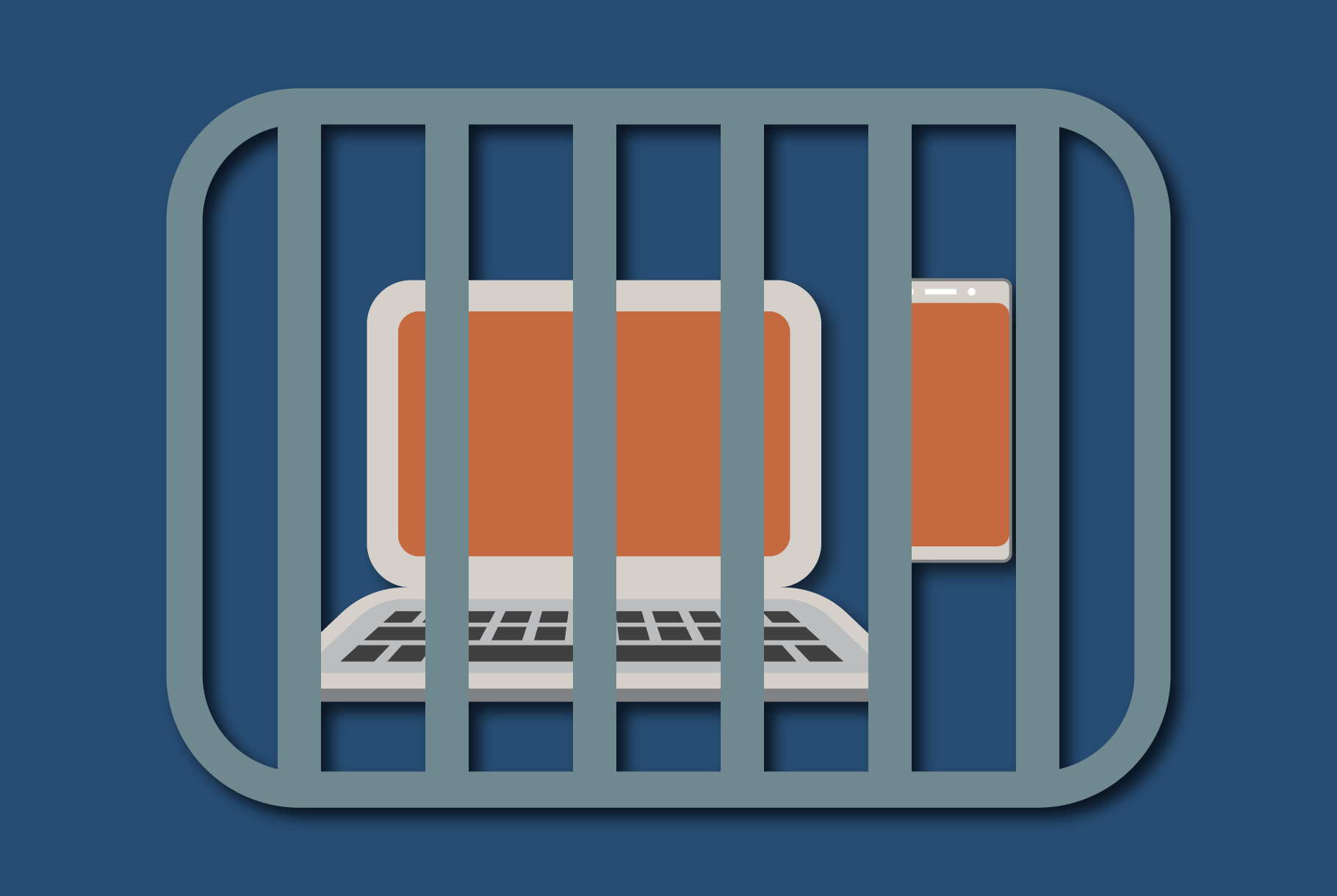 The Computer Crime Act (no. 2) (CCA) 2560 has come into force, with some of the provisions, including Section 14, being revised causing controversies since it has often been invoked along with libel law to stifle the right to freedom of expression. Although it should have been invoked to suppress only computer fraud, the CCA has been consistently misused. In 2018, despite its revision the CCA law has been used to restrict freedom of expression incessantly.
The Computer Crime Act (no. 2) (CCA) 2560 has come into force, with some of the provisions, including Section 14, being revised causing controversies since it has often been invoked along with libel law to stifle the right to freedom of expression. Although it should have been invoked to suppress only computer fraud, the CCA has been consistently misused. In 2018, despite its revision the CCA law has been used to restrict freedom of expression incessantly.
Thai Lawyers for Human Rights (TLHR) has found that 14 new cases have been prosecuted invoking the Computer Crime Act’s Section 14 against individuals who have shared posts from certain Facebook pages including “I Must Have Received 100 Million Baht from Thaksin” and “KonThaiUK”, or even non-political Facebook pages such as “CSI LA.” Legal actions related to the three Facebook pages have led to the prosecution of at least 28 individuals. The posts incriminated in these cases are mostly criticisms or observations about the performance of duties, the disbursement of budget, or alleged corruption by government officials and the NCPO. This is yet to mention a threat to press charges against those who shared the video music “Prathet Kumi.”
Even the Facebook live feed by Leader and two Executive Committee Members of the Future Forward Party criticizing how the pro-military junta party coopted former MPs from different political parties to support General Prayut Chan-o-cha has resulted in legal action. The FFP’s core members have been accused of inputting false information into a computer system which may have affected national security. Despite the pro-junta faction including the Sam Mitra admitting to coopting these MPs into their party, news which was widely reported, no other individuals are being prosecuted for such a case.
Several individuals including academics, students, activists and politicians have found themselves becoming suspects in the Computer Crime Act including Charnvit Kasetsiri, Netiwit Chotiphatphaisal, Anon Nampa, Watana Muangsook, Pichai Naripthaphan, Seripisut Temiyavet, Lieutenant Sunisa Lertpakawat aka ‘Muad Jeab’, Pavin Chachavalpongpun, core members of the Phue Thai Party who gave a press conference about the Party’s achievements, and Ekkachai Hongkangwan who has posted to recount his life behind bars.
1,643 days of Sirapop: The extremely protracted trials and the endless procrastination
 Among cases handled by the Thai Lawyers for Human Rights (TLHR), there are still 28 cases in which civilians have to stand trial in the Military Court. It is well known how protracted the trials in the Military Court are and how witness examination can be rescheduled time and again. In addition, some defendants assisted by TLHR have consistently been denied bail despite many attempts to bail them out.
Among cases handled by the Thai Lawyers for Human Rights (TLHR), there are still 28 cases in which civilians have to stand trial in the Military Court. It is well known how protracted the trials in the Military Court are and how witness examination can be rescheduled time and again. In addition, some defendants assisted by TLHR have consistently been denied bail despite many attempts to bail them out.
Among those defendants who have successively been denied the right to bail and remanded in custody, the longest is Mr. Sirapop aka “Roongsila”, a political writer and poet who is accused of violating the Penal Code’s Section 112 and the Computer Crime Act’s Section 14 (3) as a result of his writing and posting three poems on a website. Since his first remand in custody until the end of 2018, Sirapop has been incarcerated for 1,643 days or four years and five months. Seven attempts to post bail have been made to no avail.
Sirapop is a civilian whose fate has to linger on the second longest in the Military Court: as of December 31, 2018, he has been indicted for 1,560 days. After four and a half years, only three witnesses have been examined. Two of the three civilians who are listed as prosecution witnesses in this case had refused to turn up at the Court citing their personal obligations and how the military prosecutor was unable to get them to the Court. As a result, the witness examination had rescheduled seven times.
The case with the most protracted trial is the case against Mr. Sombat Boonngamanong who is accused of committing sedition per the Penal Code’s Section 116 as a result of posting his photo while flashing three fingers after the coup. 1,617 days after its indictment, the trial is still inching through defendant witness examination.
All in all, Sirapop has wasted 637 days awaiting the witness examination, or 41% of the duration from his indictment until now. The protracted process in the Military Court coupled with the denial of the right to bail, a fundamental right that should be offered equally to everyone, have profoundly affected life of the defendants who have to wait to prove their innocence.
An octogenarian woman and an 18-year-old boy, the age gap between two suspects criminalized for their public assembly
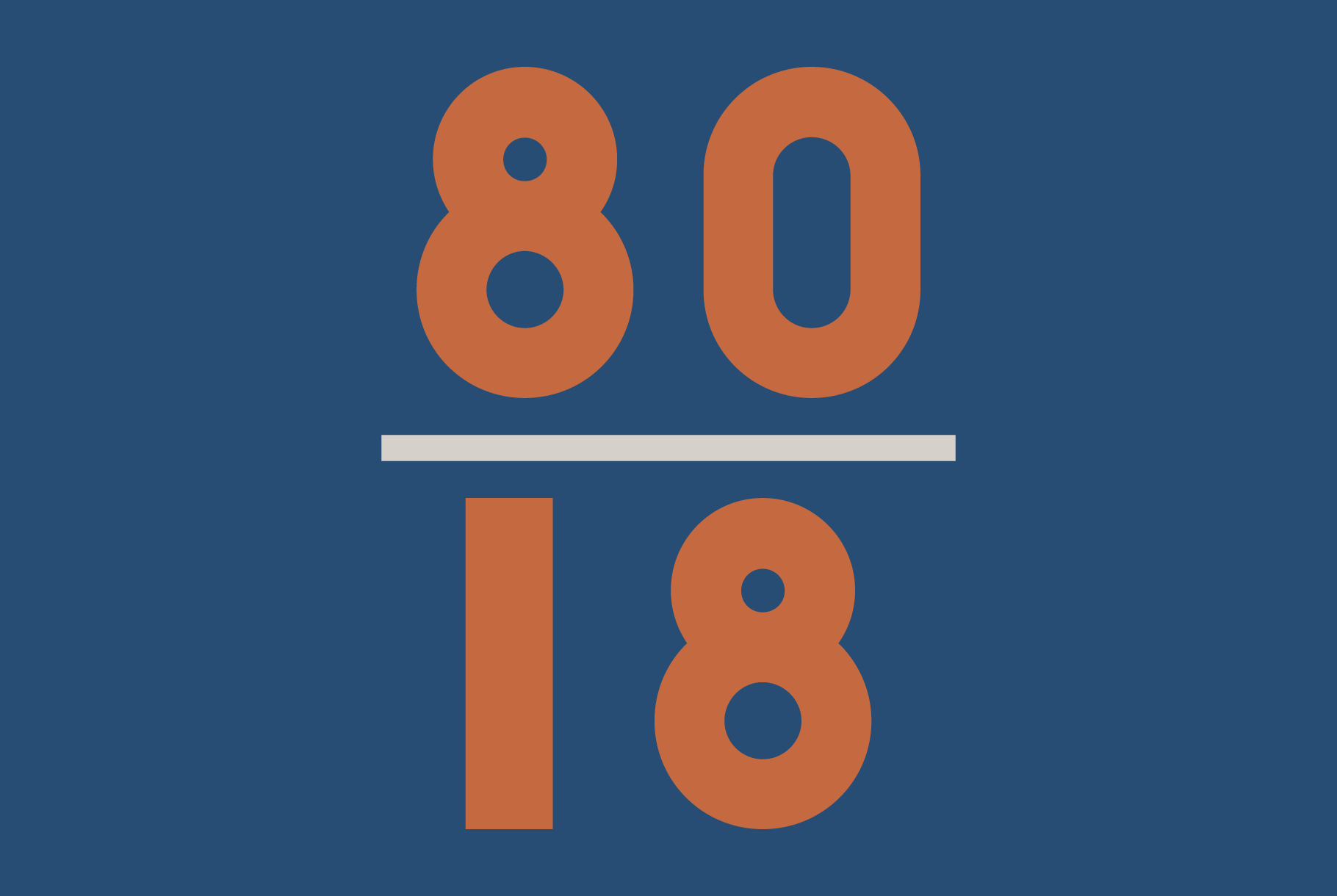 2018 is the year of rallying cry for elections due to various factors – most notably the protracted four years in power of the coup-makers and how national elections have been postponed time and again. It has prompted the formation of a movement of “pro election activists” who fervently yearn for an open and democratic society and have taken to the street many times. As a result, cases have been reported against them by the NCPO in almost all of the demonstrations and against most of them regardless of their ages.
2018 is the year of rallying cry for elections due to various factors – most notably the protracted four years in power of the coup-makers and how national elections have been postponed time and again. It has prompted the formation of a movement of “pro election activists” who fervently yearn for an open and democratic society and have taken to the street many times. As a result, cases have been reported against them by the NCPO in almost all of the demonstrations and against most of them regardless of their ages.
The oldest defendant this year who has been prosecuted as a result of exercising her right to freedom of expression and assembly is Auntie Kongmat Rassamithat, 80, whereas the youngest suspect in the case against Pro-Election Activists is Mr. Thanawat Promchak, 20. Both have been taken to court after having marched with other demonstrators to protest in front of the Royal Thai Army Headquarters. Thanawat, however, also faces another charge for speaking during the rally to mark the fourth anniversary of the military coup. If the Court convicts Auntie Kongmat for public demonstration and Thanawat for speaking publicly to demand the NCPO hold elections in 2018, the octogenarian could face up to six months and a fine of 10,000 baht while Thanawat could face up to 7 years from committing sedition per the Penal Code’s Section 116.
26 (or 20%) of the total 130 individuals who are criminalized in the cases against the pro election activists are 60 years old or older. The same percentage goes with persons who are younger than 30 years; 28 of them are prosecuted, more than half of whom are still students.
The youngest person charged is a member of farmer group of Ban Doi Thevada in Phayao Province who organized a public march in their own village to show their solidarity with members of the “We Walk…Walk for Friendships” who have come out to demand justice on land issues and the exercise of rights and freedoms and later had to face legal harassment initiated by the military. Mr. Boonyuen Saengkaew, 18, was charged together with ten other villagers and students, among whom three are over 60 years old. Nevertheless, as both the police and public prosecutor had decided to drop the charges, the legal action against them had also been brought to a halt.
During the time the strongmen rule the country, they have issued many decrees and imposed them on the people and charted the course of the country into the next 20 years. Well over a half of them are conservatives in their retirement age (60% of members of the NCPO, 75% of members of the National Legislative Assembly (NLA) and over 65% of members of the National Strategic Committee). Despite that, there are people of the same generation and the millennials who have taken to the street to resist their power. People of the two generations who may envisage different futures are rewarded so differently. The latter group, however, continues to pin their hopes on the transition to a democracy where people can enjoy their rights and freedoms, in the next year and beyond.
